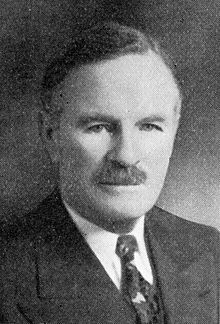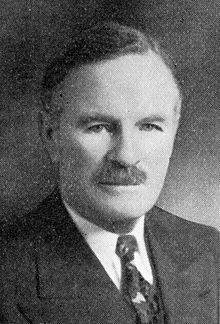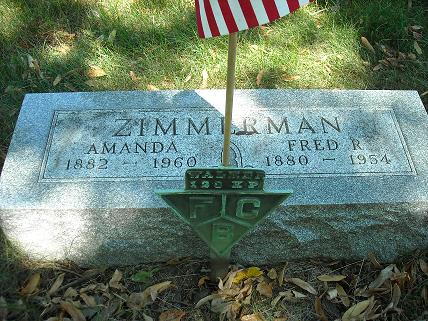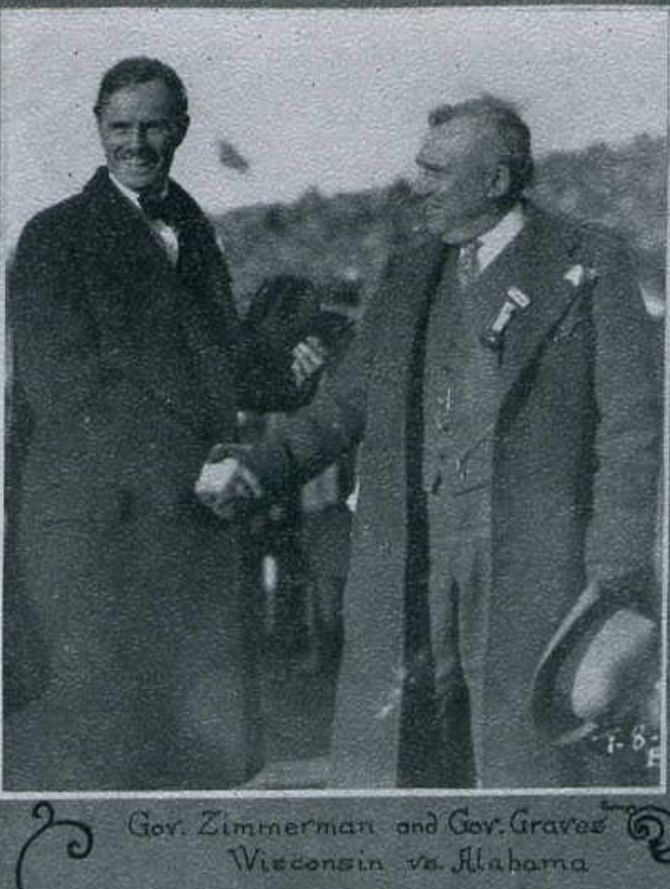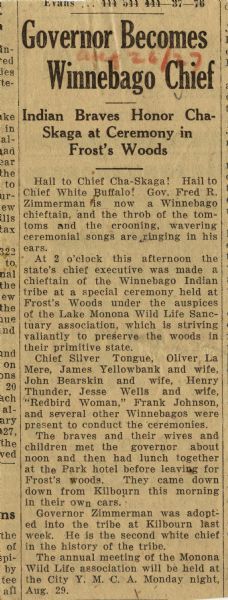Zimmerman was born in Milwaukee, son of Charles E. Zimmerman and Augusta Fiesenhauser Zimmerman. He was a grandson of German-American "Forty-Eighters," immigrants to the United States from what is today Germany who left in the aftermath of political turmoil in Europe in 1848. His father was born in New York state and came to Milwaukee in 1875. His mother was born in Wisconsin of parents who were natives of Stuttgart.
Zimmerman's father, a molder, died when he was 5 and at an early age Zimmerman began contributing to the support of his family by selling newspapers. After completing grammar school, he attended night school briefly, and held various jobs until he was 22, when he started the Bee Hive Dairy, distributing milk to Milwaukee residents. He left this job, after his marriage, to take a position as a traveling salesman with the Pfister & Vogel Leather Company, and also worked as a bookkeeper for a Milwaukee lumber firm.
Zimmerman was elected to the Wisconsin State Assembly by six votes in 1908 in a three-way race, receiving 1703 votes on the Republican ticket to 1697 for Democrat Harry R. McLogan, and 1159 for Socialist Gilbert H. Poor, to represent the 8th Milwaukee County district (8th and 23d wards of the City of Milwaukee).
Zimmermann was an active member of the Progressive faction of the Republican Party in Wisconsin, but served only one term in the legislature (1909–1910), losing the 1910 election in a four-way contest to Socialist James H. Vint with 1521 votes, to 1501 for Zimmerman, 143 for McLogan, and 12 for Prohibitionist William H. Trout.
In 1922, Zimmerman (by then an industrial relations manager for Nash Motors) had moved to the Town of Lake (now part of the City of Milwaukee) and served two years on the Town Board. He received the Republican nomination as Wisconsin Secretary of State in 1922, winning the general election with 77.7% of the vote in a four-way race. He was re-elected in 1924 in a five-way race, earning a then-record 509,771 votes statewide. During this period he remained closely identified with the Progressive faction of the Republican Party.
When the Progressives refused to endorse him in the gubernatorial election in 1926 (because of his failure to support the 1924 Presidential candidacy of Robert M. La Follette Sr.), Zimmerman ran in the Republican primary election as an "independent" against both "Progressive" Republican Herman Ekern and "Stalwart" Republican Charles B. Perry, as well as another "independent". Zimmerman won the Republican nomination and was elected in the general election by an absolute majority, outpolling the "Stalwart" Perry (who came in second, running in the general election as an "Independent"), as well as the Democratic, Socialist, Prohibitionist and Socialist Labor candidates combined. Zimmerman received 350,927 votes out of 552,921.
In 1928 Zimmerman was defeated for re-nomination as Governor, running a poor third to "Stalwart" Republican Walter J. Kohler Sr. (the winner of the primary) and "Progressive" Republican Congressman Joseph D. Beck. Thereafter he went into a political decline for several years, briefly holding a position in the Beverage Tax Commission in 1936.
Zimmerman was again elected Secretary of State of Wisconsin on the Republican ticket in 1938 and served until his death, polling a larger vote at each subsequent election. In 1952 he again received the highest total (to that time) ever given any candidate for any office in the state.
Zimmerman was a delegate to the Republican National Conventions in 1916, 1920, 1924, 1940, and 1944. He was attacked as a member of America First, but he denied membership in the organization, although his positions could be seen as aligned with isolationist ideas.
Zimmerman assisted with efforts to promote conservation in the 1920s. In 1927 the Ho-Chunk Nation (then called the "Winnebago Indian Tribe") formally adopted Zimmerman into the tribe and designated him an honorary Chief, an honor extended to few non-Ho-Chunk individuals before or since.
Fred Zimmerman died in Milwaukee in December 1954, just after again winning re-election as Wisconsin Secretary of State. He was succeeded by his son Robert, who had worked as an Assistant Secretary of State since 1939. When a constitutional officer dies in office in Wisconsin the Governor appoints a successor and so Governor Walter Kohler appointed the younger Zimmerman to succeed his father. Robert Zimmerman would serve in the role until January 1975.
Source: Wikipedia, checked with Zimmerman's bio at the Wisconsin Historical Society website
Zimmerman was born in Milwaukee, son of Charles E. Zimmerman and Augusta Fiesenhauser Zimmerman. He was a grandson of German-American "Forty-Eighters," immigrants to the United States from what is today Germany who left in the aftermath of political turmoil in Europe in 1848. His father was born in New York state and came to Milwaukee in 1875. His mother was born in Wisconsin of parents who were natives of Stuttgart.
Zimmerman's father, a molder, died when he was 5 and at an early age Zimmerman began contributing to the support of his family by selling newspapers. After completing grammar school, he attended night school briefly, and held various jobs until he was 22, when he started the Bee Hive Dairy, distributing milk to Milwaukee residents. He left this job, after his marriage, to take a position as a traveling salesman with the Pfister & Vogel Leather Company, and also worked as a bookkeeper for a Milwaukee lumber firm.
Zimmerman was elected to the Wisconsin State Assembly by six votes in 1908 in a three-way race, receiving 1703 votes on the Republican ticket to 1697 for Democrat Harry R. McLogan, and 1159 for Socialist Gilbert H. Poor, to represent the 8th Milwaukee County district (8th and 23d wards of the City of Milwaukee).
Zimmermann was an active member of the Progressive faction of the Republican Party in Wisconsin, but served only one term in the legislature (1909–1910), losing the 1910 election in a four-way contest to Socialist James H. Vint with 1521 votes, to 1501 for Zimmerman, 143 for McLogan, and 12 for Prohibitionist William H. Trout.
In 1922, Zimmerman (by then an industrial relations manager for Nash Motors) had moved to the Town of Lake (now part of the City of Milwaukee) and served two years on the Town Board. He received the Republican nomination as Wisconsin Secretary of State in 1922, winning the general election with 77.7% of the vote in a four-way race. He was re-elected in 1924 in a five-way race, earning a then-record 509,771 votes statewide. During this period he remained closely identified with the Progressive faction of the Republican Party.
When the Progressives refused to endorse him in the gubernatorial election in 1926 (because of his failure to support the 1924 Presidential candidacy of Robert M. La Follette Sr.), Zimmerman ran in the Republican primary election as an "independent" against both "Progressive" Republican Herman Ekern and "Stalwart" Republican Charles B. Perry, as well as another "independent". Zimmerman won the Republican nomination and was elected in the general election by an absolute majority, outpolling the "Stalwart" Perry (who came in second, running in the general election as an "Independent"), as well as the Democratic, Socialist, Prohibitionist and Socialist Labor candidates combined. Zimmerman received 350,927 votes out of 552,921.
In 1928 Zimmerman was defeated for re-nomination as Governor, running a poor third to "Stalwart" Republican Walter J. Kohler Sr. (the winner of the primary) and "Progressive" Republican Congressman Joseph D. Beck. Thereafter he went into a political decline for several years, briefly holding a position in the Beverage Tax Commission in 1936.
Zimmerman was again elected Secretary of State of Wisconsin on the Republican ticket in 1938 and served until his death, polling a larger vote at each subsequent election. In 1952 he again received the highest total (to that time) ever given any candidate for any office in the state.
Zimmerman was a delegate to the Republican National Conventions in 1916, 1920, 1924, 1940, and 1944. He was attacked as a member of America First, but he denied membership in the organization, although his positions could be seen as aligned with isolationist ideas.
Zimmerman assisted with efforts to promote conservation in the 1920s. In 1927 the Ho-Chunk Nation (then called the "Winnebago Indian Tribe") formally adopted Zimmerman into the tribe and designated him an honorary Chief, an honor extended to few non-Ho-Chunk individuals before or since.
Fred Zimmerman died in Milwaukee in December 1954, just after again winning re-election as Wisconsin Secretary of State. He was succeeded by his son Robert, who had worked as an Assistant Secretary of State since 1939. When a constitutional officer dies in office in Wisconsin the Governor appoints a successor and so Governor Walter Kohler appointed the younger Zimmerman to succeed his father. Robert Zimmerman would serve in the role until January 1975.
Source: Wikipedia, checked with Zimmerman's bio at the Wisconsin Historical Society website
Family Members
Sponsored by Ancestry
Advertisement
Explore more
Sponsored by Ancestry
Advertisement
